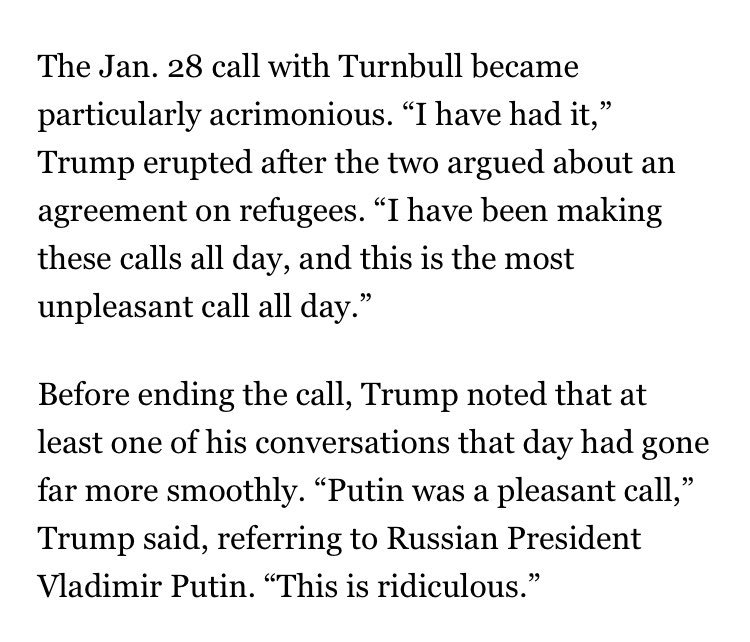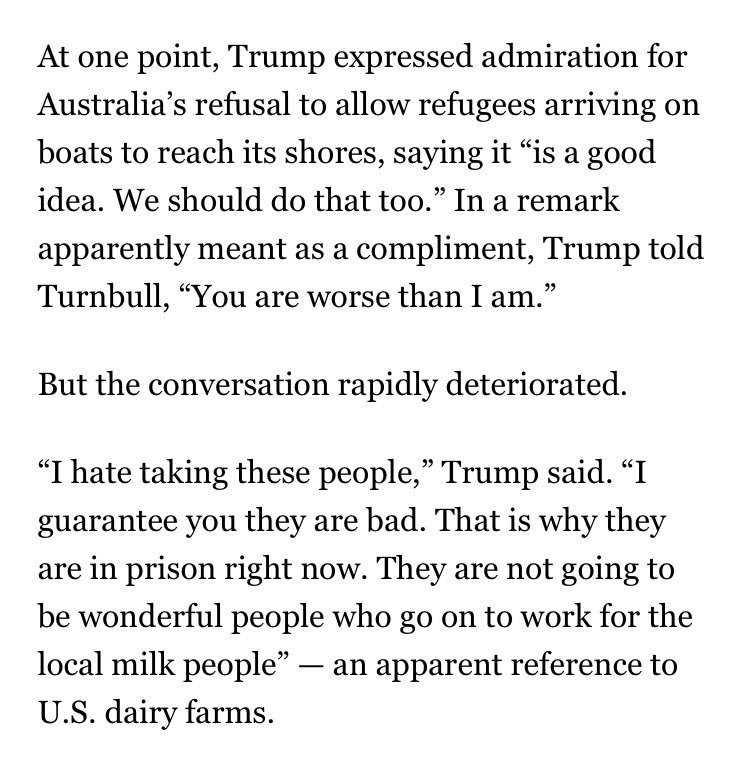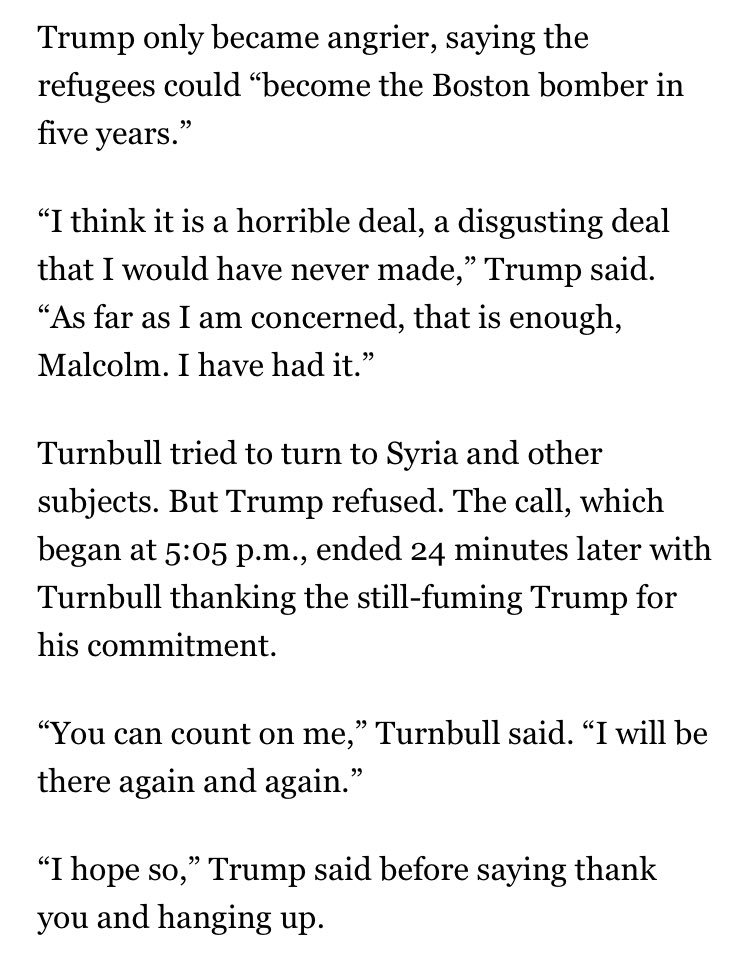Leaked transcripts prove embarrassing for both Trump and Turnbull

 LEAKED transcripts of United States President Donald Trump’s phone calls with world leaders are proving to be the latest indiscretion to leave the leader red-faced, calling into question his grasp on current affairs and the integrity of the White House.
LEAKED transcripts of United States President Donald Trump’s phone calls with world leaders are proving to be the latest indiscretion to leave the leader red-faced, calling into question his grasp on current affairs and the integrity of the White House.



By
 LEAKED transcripts of United States President Donald Trump’s phone calls with world leaders are proving to be the latest indiscretion to leave the leader red-faced, calling into question his grasp on current affairs and the integrity of the White House.
LEAKED transcripts of United States President Donald Trump’s phone calls with world leaders are proving to be the latest indiscretion to leave the leader red-faced, calling into question his grasp on current affairs and the integrity of the White House.
This particular incident, along with highlighting the chaos that appears to reign supreme in the Oval Office, has also dragged Australia’s Prime Minister Malcolm Turnbull into the non-too-favourable spotlight.
The transcripts in question, leaked to The Washington Post, detail a phone conversation between Trump and Mexico’s President Pena Nieto, and one with Turnbull, that took place in January following Trump’s inauguration.
Washington Post has the transcript of Trump's call with Turnbull about the refugee deal, and.... wow https://www.washingtonpost.com/world/national-security/you-cannot-say-that-to-the-press-trump-urged-mexican-president-to-end-his-public-defiance-on-border-wall-transcript-reveals/2017/08/03/0c2c0a4e-7610-11e7-8f39-eeb7d3a2d304_story.html …
At the time, media speculation surrounded Trump’s call with Turnbull after The Post reported Trump had blasted Turnbull over a refugee deal reached under the Obama administration, reportedly calling it “the worst deal ever” and hanging up after just 25 minutes.
Turnbull himself alluded to a disagreement during a radio interview after news of the conversation broke, and sources from Canberra appeared to confirm The Post’s version of events.
The White House stuck to their party line, with then-Press Secretary Sean Spicer describing the call as “cordial” and “respectful”. Trump himself claimed they “had a very nice call” and blamed the press for misreporting for their own agenda.
Thank you to Prime Minister of Australia for telling the truth about our very civil conversation that FAKE NEWS media lied about. Very nice!
Following the release of the transcripts on Thursday, the world need speculate no more. They lay out in black and white exactly how the call transpired, and highlight Trump’s confusion, lack of understanding, and the sometimes-brutal reality of each nations’ immigration policies.
In the call, Trump makes his opposition to refugees and asylum seekers clear, bragging he was “the world’s greatest person that does not want to let people into the country”. He displayed disdain for the deal to admit to the US refugees currently held on Manus Island and Nauru, declaring it a “stupid deal” that will make him “look terrible,” furious that abiding by the agreement could harm his image among voters.

Men shave, brush their teeth and prepare for the day at an Australian offshore processing refugee camp on the Island of Nauru. Source: AP
He also called into question the moral integrity of the asylum seekers being considered for resettlement.
“Does anybody know who these people are? Who are they? Where do they come from? Are they going to become the Boston bomber in five years? Or two years? Who are these people?” he said.
Turnbull is forced to repeatedly correct several points about the deal that Trump appeared to have misunderstood or was unfamiliar with, such as the numbers of refugees the US is to consider.
“We have our San Bernardino’s, we have had the World Trade Center come down because of people that should not have been in our country, and now we are supposed to take 2,000 (refugees),” Trump says, repeating several times throughout the conversation his mistakenly inflated number of people the US is required to take.“The obligation is for the US to look and examine and take up to and only if they so choose – 1,250 to 2,000,” Turnbull responds.
“Every individual is subject to your vetting. You can decide to take them or to not take them after vetting.”
“You can decide to take 1,000 or 100. It is entirely up to you.”
Trump’s grasp of the Australia’s immigration policy also appears weak in the exchange.
When learning of the country’s “commitment to not allow people to arrive by boat”, Trump exclaimed, “That is a good idea. We should do that too. You are worse than I am.” – a point that, to many, has highlighted the severity of Australia’s unwavering approach to so-called ‘boat people’.
It is not just Trump, however, who exhibits his steelier side in this exchange. Turnbull has also received criticism for his efforts to convince Trump to stick to the deal.
In an attempt to assuage Trump’s concerns for US security, Turnbull repeatedly tries to assure the president those held on Australia’s offshore islands were “economic refugees”.
“They are basically economic refugees from Iran, Pakistan, and Afghanistan. That is the vast bulk of them. They have been under our supervision for over three years now and we know exactly everything about them,” Turnbull said.

Refugee advocates hold placards and banners during a protest in central Sydney, Australia, in 2016, calling for the closure of the Australian detention centres in Nauru and Manus Island. Source: Reuters/David Gray
In fact, all the people being considered for resettlement in the US have undergone extensive refugee status determination and have been found to be genuine refugees who face a “well-founded fear of persecution” – as is the legal United Nations High Commissioner for Refugees (UNHCR) definition.
“Economic refugees”, as Turnbull describes them, do not exist as economic hardship is not a criterion for refugee status.
Finding commonalities between the two countries’ immigration policies, Turnbull is candid about the discriminatory selection process for Australia’s resettlement of Syrian and Iraqi refugees.
The government agreed to rehome 12,000 persons displaced through conflict. In the transcript, Turnbull is explicit in his country’s preference for Christians, despite them only making up 0.1 percent of the Iraqi population and less than 10 percent of Syria, as reported by The Guardian.
“This is exactly what we have done with the programme to bring in 12,000 Syrian refugees, 90 percent of which will be Christians. It will be quite deliberate and the position I have taken – I have been very open about it – is that it is a tragic fact of life that when the situation in the Middle East settles down – the people that are going to be most unlikely to have a continuing home are those Christian minorities.”
Despite Turnbull’s attempts at finding common ground and understanding, Trump ends the call abruptly, clearly not happy with the direction of the conversation.
In most instances, that would be the end of it. But with the leak of these transcripts, the world has been left a rather embarrassing and concerning insight into a conversation both leaders never imagined would see the light of day.




